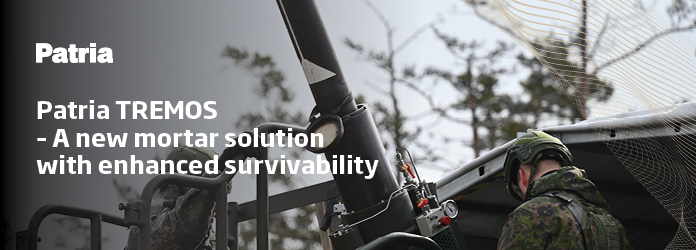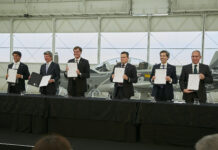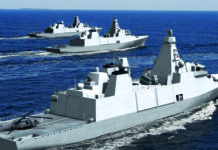Embraer Defense & Security is the leading aerospace and defence industry in Latin America. In addition to the A-29 SUPER TUCANO light attack and advanced trainer and the multi-mission KC-390 military airlift, it provides a full line of integrated solutions and applications such as Command and Control Center (C4I), radars, ISR (Intelligence, Surveillance & Reconnaissance) and space. ESD had the opportunity to talk to Jackson Schneider, President & CEO, Embraer Defense & Security.
ESD: How do you see the market for Embraer’s defence products?
Schneider: We have a complete portfolio that goes beyond the aircraft, including solutions for air, land, sea, space and cyber. We’ll continue with a widen defence and security focus, our main business, but we are also open to diversification opportunities, evaluating potential partnerships and new businesses in high technology segments related to our business, such as cyber security, air traffic control and satellites. In terms of new developments, we have signed two memorandums of understanding (MoU) with the Brazilian Air Force (FAB). The first was established for a study of a potential development of a short take-off utility transport (STOUT). The second is a cooperation for the study and evaluation of the necessary capabilities for the conceptual design and development of advanced unmanned combat aerial vehicle (UCAV).
ESD: The C-390 has been successful in approaching the European market, with specific interest and orders already achieved: which are your next key goals in the region, and what does the C-390 offer that other contenders cannot?
Schneider: The C-390 MILLENIUM, or KC-390 MILLENIUM when the customer opts for its tanker additional capability, was designed to establish new standards in its category, offering outstanding mobility, quick reconfiguration, high availability, greater flexibility, and easier maintenance in a unique platform. Since it entered operation with the Brazilian Air Force (FAB), the KC-390 MILLENIUM has been proving its excellent performance, reliability and capacity as a new generation multi-mission aircraft. We have delivered four multi-mission KC-390 MILLENIUM to FAB and deliveries for Portugal and Hungary are scheduled to begin in 2023. Regarding new contracts, we cannot comment about new sales prospects, but we are very confident and optimistic. However, I can tell that since we received orders from Portugal and Hungary, two NATO nations, there was a growing interest around the C-390 MILLENIUM in the international market and there are several potential customers requesting information about to aircraft.
ESD: Increase in low(er) cost platforms for Light Attack, Air Support and Training has been growing throughout Europe and NATO. The market is highly competitive, so what successes has the SUPER TUCANO achieved, and why? In terms of using a lightweight aircraft to deliver longer-range, heavier ordnance, what does the SUPER TUCANO now offer, and what of the future?
Schneider: The A-29 SUPER TUCANO is the worldwide benchmark for close air support and light-attack. It is an extremely rugged, combat proven platform and a reference for basic and advanced training. The aircraft was selected by more than 15 air forces around the globe, including the United States Air Force (USAF), and over 250 A-29 SUPER TUCANOs were delivered, accumulating more than 430,000 flight-hours, of which over 60,000 flight-hours were spent in combat. The A-29 was designed to operate from austere and unprepared surfaces. This design strength not only creates significant operational flexibility, it also enhances the overall survivability of the aircraft especially compared to the vulnerabilities of aircraft that need to operate from established airfields. In October 2020, the Philippine Air Force (PAF) became the newest A-29 SUPER TUCANO operator, when all six aircraft ordered were delivered. During the first quarter of 2021, the first two A-29 SUPER TUCANO for the Combat Aviation Advisor (CAA) mission for the Air Force Special Operations Command (AFSOC) programme were delivered to Sierra Nevada Corporation (SNC). Embraer also delivered the seventh aircraft of the Nigeria Programme for the Nigerian Air Force (NAF) and supported SNC and the United States Government during the flight test campaign, as part of the Military Flight Release Phase II of the Nigeria Programme. The full fleet of A-29 SUPER TUCANO aircraft for the NAF are currently in production by SNC and Embraer at the Jacksonville facility with delivery to the NAF expected on schedule in 2021. Regarding new contracts, there are several cases in different stages, but we cannot comment.
ESD: In past few years, Embraer Defence has diversified its portfolio of products. How this is going?
Schneider: In its path for diversification, Embraer acquired some companies in recent years, such as Atech, whose main expertise lies in the development of innovative solutions with applications in the areas of air traffic control, command and control systems, instrumentation & control systems, embedded systems and simulators. Atech is part of Águas Azuis Consortium, formed by thyssenkrupp Marine Systems and Embraer Defense & Security, selected by the Brazilian Navy for the construction of four surface vessels in the TAMANDARÉ Class. Also, in our strategy to grow in related fields, Embraer Defense & Security believes that there is a growing demand for cyber security solutions in the global
defence market. Therefore, the company announced a contract for a capital investment in Tempest Security Intelligence. The largest cybersecurity company in Brazil, Tempest positions itself as a provider of complete solutions for business protection in the digital world. By Investing in Tempest, Embraer seeks to enhance the company’s prospects for growth and expansion in both Brazil and abroad.
ESD: You mentioned the TAMANDARÉ class programme. Can you explain more about this programme?
Schneider: Emgepron, an independent state company, linked to the Ministry of Defense through the Brazilian Navy Command, and Águas Azuis signed last year the contract to build four state-of-the-art TAMANDARÉ class ships, with deliveries scheduled between 2025 and 2028. The construction will take place 100% in Brazil and is expected to have local content rates above 30% for the first vessel and 40% for the others. thyssenkrupp will supply the naval technology of its proven MEKO class vessels that are already in operation in 15 countries. Embraer will integrate sensors and weaponry into the combat system, bringing also to the programme its more than 50 years’ experience in systems technology solutions and in-service support. In addition to construction, the contract includes a sustained transfer of technology in naval engineering for building military ships and combat and platform management systems, as well as integrated logistical support and lifecycle management. It provides for a solid national partnership model with proven ability to transfer technology and qualify local labour, which guarantees the development of future strategic defence projects in Brazil. The naval alliance between thyssenkrupp Marine Systems and Embraer Defense & Security can also enable creating a base for exporting naval defence products from Brazil.
The interview was conducted by Stephen Barnard and originally appeared in the July issue of European Security & Defence. Click here to download the full issue in PDF format.









